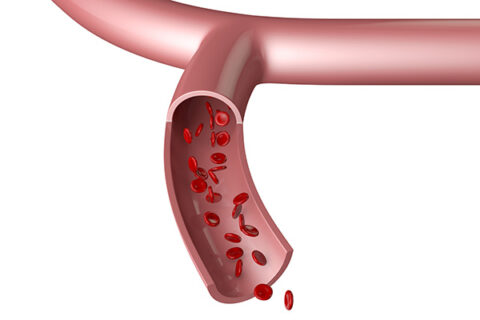A protein makes the difference
FAU researchers discover that blood vessels can inhibit tumour growth
It is well-established knowledge that blood vessels foster the growth of tumours. Preventing the formation of tumours is a standard part of cancer therapy. A study by researchers at FAU has discovered a new, surprising role played by blood vessels: under certain conditions they can inhibit tumour growth.
When tumours develop they absorb oxygen and nutrients from the surrounding tissue. Once the tumour reaches a certain size, this is no longer enough to allow it to continue growing. It needs new blood vessels to deliver oxygen and nutrients. A common form of cancer therapy involves inhibiting angiogenesis, or the development of new blood vessels. However, this therapy does not work for all patients and the reasons were not known for a long time.
To solve this mystery, a team led by PD Dr. Elisabeth Naschberger and doctoral candidate Andrea Liebl from the Professorship for Molecular and Experimental Surgery at the Department of Surgery at Universitätsklinikum Erlangen investigated endothelial cells, the cells which form blood vessels. They suspected that endothelial cells in different tumours have different characteristics and thus react differently to therapy.
Protein inhibits growth of blood vessels
The researchers began by isolating endothelial cells from intestinal tumours from patients with both good and poor prognoses and then compared the cells in cultures. They found that the endothelial cells from tumours of patients with a good prognosis produced the protein SPARCL1 – and that SPARCL1 inhibits the growth of both endothelial cells and tumour cells.
Further analysis of tissue samples revealed that SPARCL1 stabilises mature blood vessels in healthy intestinal tissue, thus inhibiting the formation of new blood vessels. SPARCL1 was found in tumours with good prognoses. In contrast the protein was deactivated in tumours with poor prognoses; in these cases new blood vessels were formed and the tumours continued to grow. The researchers refuted the dominant opinion with their results: ‘Previously the assumption was that blood vessels always benefit tumour growth. However, we have shown that blood vessels, if they contain the protein SPARCL1, can also stem tumour growth,’ explains Prof. Dr. Dr. Michael Stürzl, Professor of Molecular and Experimental Surgery.
‘The study also shows why tumours in many cases continue to grow despite therapy intended to inhibit blood vessels,’ adds Stürzl. ‘In tumours whose blood vessels produce SPARCL1 and which are already adequately supplied with oxygen and nutrients, suppression of the blood vessels could foster tumour growth. It’s important to note that the study does not recommend that antiangiogenic therapy not be used, but rather explains why such therapies may not be effective in all patients.’ The researchers’ next step is to work on developing the results for eventual use in cancer treatments.
The project received funding from the Interdisciplinary Centre for Clinical Research at Universitätsklinikum Erlangen, Deutsche Krebshilfe, the German Research Foundation and the Emerging Fields Initiative at FAU.
The researchers have published their results in the Journal of Clinical Investigation: http://www.jci.org/articles/view/78260
Further information:
Prof. Dr. Dr. Michael Stürzl
+49 9131 8539522
michael.stuerzl@uk-erlangen.de
